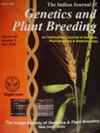Quality evaluation of near isogenic lines of wheat developed through marker assisted backcross breeding for grain softness
IF 1
4区 生物学
Q3 PLANT SCIENCES
引用次数: 0
Abstract
A set of 16 Near Isogenic Lines (NILs) developed from a cross, Barham x DBW14 for grain softness gene (Pina-D1aPinbD1a) combined with Lr37-Yr17-Sr38 segment was evaluated for different quality traits. Rheological test of flour and baking test with sugar-snap cookies were also performed. The Hardness Index of the NILs ranged between 13.86 and 47.13. The flour of the NILs had relatively lower proportion of particles >150 μm than in the classes of 0 to ≤ 55 μm and > 55 to ≤ 105 μm. Starch damage of all the NILs was significantly lower than the hard grain parent DBW14 (4.54%) and the popular variety HD2967 (7.49%). All the 16 NILs showed optimum Solvent Retention Capacity of NaSRC ≤ 64% and SucroseSRC ≤ 89%. The farinograms of all the NILs were typical of weak gluten with low water absorption capacity. The alveographs showed an Extensibility ratio (P/L) between 0.17 and 0.36, and much lower Deformation Energy (46-94 J) for the NILs. The spread factor of the cookies made with the flour of the NILs varied between 7.90 and 12.77, while that ofthe soft grain parent was 9.44. The findings suggest that the NILs developed in the Indian wheat variety DBW14 may be suitable for production of flour for making cakes, cookies, muffins, etc. These NILs, after evaluation in varietal trials and release for cultivation, can have a strong domestic and export potential. Thus, marker assisted selection is a useful tool for the targeted quality breeding.小麦籽粒柔软度标记辅助回交选育近等基因系的品质评价
以籽粒柔软度基因(Pina-D1aPinbD1a)与Lr37-Yr17-Sr38片段组合的Barham x DBW14为材料,建立了一套16个近等基因系(NIL),对不同品质性状进行了评价。还进行了面粉的流变学试验和糖脆饼干的烘焙试验。NIL的硬度指数在13.86和47.13之间。NIL的面粉中>150μm的颗粒比例相对低于0至≤55μm和>55至≤105μm的面粉。所有NIL的淀粉损伤均显著低于硬粒亲本DBW14(4.54%)和流行品种HD2967(7.49%)。所有16个NIL的最佳溶剂保留能力均为NaSRC≤64%和SucroseSRC≤89%。所有NIL的粉质图都是典型的弱筋低吸水性。瓣膜图显示拉伸比(P/L)在0.17和0.36之间,NIL的变形能(46-94J)低得多。用NIL的面粉制成的饼干的扩散系数在7.90和12.77之间变化,而软粒亲本的扩散系数为9.44。研究结果表明,在印度小麦品种DBW14中开发的NIL可能适合生产蛋糕、饼干、松饼等面粉。这些NIL经过品种试验评估并发布用于种植,具有强大的国内和出口潜力。因此,标记辅助选择是有针对性的优质育种的有用工具。
本文章由计算机程序翻译,如有差异,请以英文原文为准。
求助全文
约1分钟内获得全文
求助全文
来源期刊

Indian Journal of Genetics and Plant Breeding
PLANT SCIENCES-
CiteScore
1.80
自引率
10.00%
发文量
0
审稿时长
6-12 weeks
期刊介绍:
Advance the cause of genetics and plant breeding and to encourage and promote study and research in these disciplines in the service of agriculture; to disseminate the knowledge of genetics and plant breeding; provide facilities for association and conference among students of genetics and plant breeding and for encouragement of close relationship between them and those in the related sciences; advocate policies in the interest of the nation in the field of genetics and plant breeding, and facilitate international cooperation in the field of genetics and plant breeding.
 求助内容:
求助内容: 应助结果提醒方式:
应助结果提醒方式:


